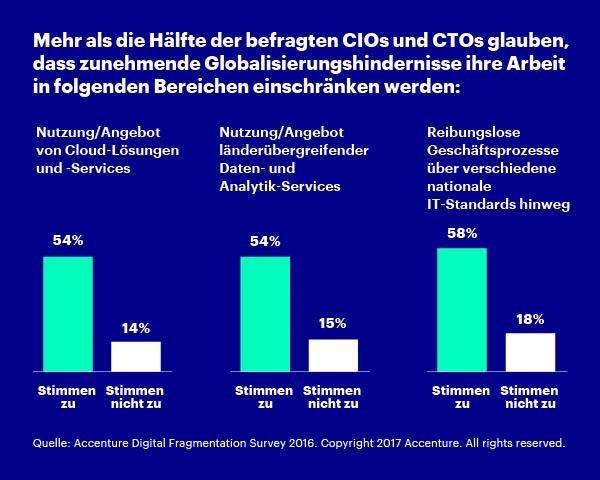"Digital fragmentation" threatens the growth prospects and innovative strength of companies
New rules and regulations in numerous countries around the world are increasingly impeding the free flow of data, IT products and IT services, as well as the mobility of IT experts across national borders. This 'digital fragmentation' is not only affecting the global economy. It also threatens companies' long-term growth prospects and innovation strategies. This is shown in a study by the consulting firm Accenture.

The study, entitled "Digital Fragmentation: Adapt to Succeed in a Fragmented World", makes clear that political specifications at national level are often made with good intentions, for example to improve data protection or increase security on the Internet. However, this has the side effect of placing restrictions on companies, which have to comply with different national regulations and invest in increased security measures. What is needed, he says, is a closer exchange between companies and governments in order to implement political requirements while at the same time maintaining their innovative strength and driving the use of new technologies.
"The key to success in the digital economy of the future lies in the use of data," explains Thomas Ruck, Managing Director at Accenture Digital - Accenture Interactive. "Data is the foundation for new digital services around connected products. With the smart combination of both, business can gain a decisive competitive advantage. We must therefore be careful to strike the right balance between necessary regulation and necessary freedom."
More than 400 chief information officers (CIOs) and chief technology officers (CTOs) from eight countries were surveyed for the study. More than 80 percent of respondents believe that globalization barriers are leading to greater vulnerability in their company's IT strategy and systems. Two comparisons show that new barriers are being created internationally: G20 members' measures restricting trade, for example, quadrupled from 324 to 1,263 between 2010 and 2016. Moreover, the number of countries with data protection laws tripled between 1995 and 2015, from 34 to over 100.
Regulation slows down business activity and innovation
The study also shows what concrete effects new rules and regulations can have on business activity. For example, more than half of the respondents worldwide believe that the use of cloud-based services, the use of data and analytics services, and the handling of business processes across different national IT standards are hampered by overgrowing regulatory barriers. "Regulation can serve as a safety net for the digital economy, but at the same time it should promote growth and innovation, not hinder it," said Thomas Ruck. "For the Swiss economy in particular, this is an existential issue. Our most important industries are all dependent on exports and are in the process of reinventing themselves with digital business models and services. We should be encouraging that, not putting the brakes on it."
According to the study, more than half of the executives surveyed worldwide feel compelled by increasing regulatory hurdles to realign their future activities in many areas. This is especially true for global IT architecture (60 percent), IT infrastructure location (52 percent), and cybersecurity strategy and resources (51 percent).
Increased cooperation required
In addition, more than 90 percent of the study participants worldwide expect IT costs to increase within the next three years. According to the study, the biggest cost drivers are above all the more expensive search for IT talent, the necessary expansion of the IT infrastructure to include new data centers, for example, and compliance with different national IT standards. "Contrary to the general tenor of the advocates of digitization, national borders still have great significance," comments Thomas Ruck. "Business leaders are increasingly recognizing their responsibility in shaping the rules for our digital future. Rapid advances in artificial intelligence development, bio-technology and the Internet of Things make it clear that this journey has only just begun - and that it requires close collaboration across national and industry boundaries."
Source and further information: Accenture









